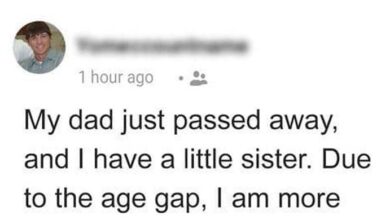
Jane’s life took a dark turn when her husband lost his job.
The man she once trusted became unrecognizable—angry, controlling, and violent.
At first, Jane endured the torment, hoping he would change. But when she began to fear not just for her safety but also for the well-being of her stepdaughter, Matilda, she realized it was time to act.
She just didn’t know how—until she made a phone call that would change everything.
On the other end of that call was Denise, a calm, composed voice in the storm.
Denise had long dreamed of joining law enforcement, inspired by her father, who had spent decades serving on the police force
She imagined herself wearing a badge, protecting the vulnerable, and bringing justice to those who needed it most.
But a devastating car accident altered that dream permanently. Denise lost both her legs, and with them, her chances of making it through the police academy’s rigorous physical requirements.
For a long time, she believed that the dream was dead. But her father urged her not to give up entirely. There were other ways to serve.
Eventually, Denise joined the emergency response system as a 911 dispatcher. It wasn’t the frontline she had envisioned, but in many ways, it was just as important.
Denise quickly found her rhythm in the high-pressure environment of emergency calls.
Each ring of the phone was unpredictable—accidents, fires, crimes in progress. Some were heartbreaking. Others were hoaxes. But she met each with dedication and empathy. She had found her place.
One afternoon, the line lit up. A call came through that, at first, seemed like a prank. Denise answered with her usual professionalism.
“911, what’s your emergency?”
A trembling voice whispered back, “Hi, my name is Jane. Can I order two pizzas, please? It’s urgent.”
Denise was puzzled. Calls like this weren’t uncommon—some people made fake emergency calls under the guise of pizza orders. She was about to hang up when Jane’s voice cracked with desperation.
“Please don’t hang up,” Jane pleaded.
That’s when Denise paused. Something in the caller’s tone—strained, scared, sincere—made her rethink. This wasn’t a joke.
It was a cry for help hidden in plain sight.
“Okay, Jane,” Denise said, her voice calm and reassuring. “I’m going to ask you a few yes-or-no questions. Just answer as best you can. Understood?”
“Yes,” Jane replied quietly.
“Are you in danger?”
“Yes.”
Denise started working quickly, tracing the call’s origin while continuing to ask questions.
“Is there someone else in the room with you?”
“Yes. Please hurry. My daughter and I haven’t eaten.”
“So it’s you and your daughter in danger. Is this a domestic situation?”
“Yes.”
“Is the person a man? Is he armed?”
“Yes,” Jane whispered.
Suddenly, a loud male voice barked in the background, “Who are you talking to? Hang up!”
Jane tried to cover, “I was just ordering pizza for—”
Then there was a sharp sound. The line went de.ad.
Denise’s heart dropped, but she already had enough to act. The address had been traced, and an emergency unit was en route.
When the officers arrived, they found the home in disarray. Bottles littered the floor, furniture was overturned, and a foul stench of alcohol lingered in the air.
Jane’s husband was found drunk and aggressive. In a back room, Jane and Matilda were huddled together, eyes wide with fear, tears streaming down their cheeks.
The man was arrested on the spot. Jane and Matilda were taken to the station for safety and questioning.
Though Denise was used to keeping emotional distance from her work, something about Jane’s case struck a personal chord. She wanted to know how the mother and daughter were doing.
Coincidentally, Jane asked to speak to Denise. She wanted to thank the voice that had saved their lives.
A few days later, they met in person for lunch. Jane brought Matilda along, and both of them embraced Denise warmly.
During the meeting, Jane opened up about her life. She told Denise how she had married Matilda’s father years ago and gradually took on the role of mother after the girl’s birth mother passed away.
Things were good at first, but the man’s personality changed after he lost his job. He spiraled into heavy drinking, became paranoid, and started to lash out violently.
Jane stayed, initially hoping things would improve.
She loved Matilda like her own and didn’t want to abandon her. But the abuse escalated. A week before the call, her husband saw her talking to a man at the grocery store.
Enraged, he locked her and Matilda inside the house, cutting them off from the outside world.
That was the breaking point. Jane knew if she didn’t act soon, things could end in tragedy.
Denise listened quietly, deeply moved. Though she couldn’t change the past, she was glad she had been there when Jane needed her most.
The legal process moved quickly. Jane’s husband was charged and denied parental rights. Jane was granted full custody of Matilda, who now officially became her daughter in every sense.
They both underwent therapy, and Denise remained a close friend, offering support where she could.
In time, the mother and daughter found stability. Laughter returned to their home. And Denise, who once feared she’d never make a difference without a badge, had proof that she already had.
With one coded phone call and one alert responder, a family was saved—and a new chapter began.




